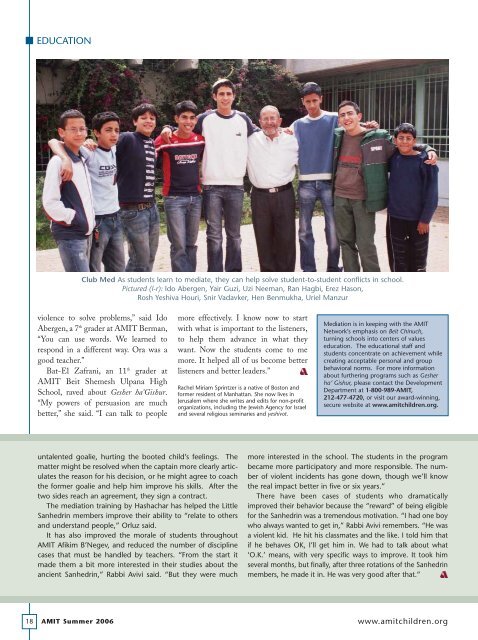Amit Magazine Summer 2006.qxd
Amit Magazine Summer 2006.qxd
Amit Magazine Summer 2006.qxd
Create successful ePaper yourself
Turn your PDF publications into a flip-book with our unique Google optimized e-Paper software.
18<br />
EDUCATION<br />
Club Med As students learn to mediate, they can help solve student-to-student conflicts in school.<br />
Pictured (l-r): Ido Abergen, Yair Guzi, Uzi Neeman, Ran Hagbi, Erez Hason,<br />
Rosh Yeshiva Houri, Snir Vadavker, Hen Benmukha, Uriel Manzur<br />
violence to solve problems,” said Ido<br />
Abergen, a 7 th grader at AMIT Berman,<br />
“You can use words. We learned to<br />
respond in a different way. Ora was a<br />
good teacher.”<br />
Bat-El Zafrani, an 11 th grader at<br />
AMIT Beit Shemesh Ulpana High<br />
School, raved about Gesher ha’Gishur.<br />
“My powers of persuasion are much<br />
better,” she said. “I can talk to people<br />
untalented goalie, hurting the booted child’s feelings. The<br />
matter might be resolved when the captain more clearly articulates<br />
the reason for his decision, or he might agree to coach<br />
the former goalie and help him improve his skills. After the<br />
two sides reach an agreement, they sign a contract.<br />
The mediation training by Hashachar has helped the Little<br />
Sanhedrin members improve their ability to “relate to others<br />
and understand people,” Orluz said.<br />
It has also improved the morale of students throughout<br />
AMIT Afikim B’Negev, and reduced the number of discipline<br />
cases that must be handled by teachers. “From the start it<br />
made them a bit more interested in their studies about the<br />
ancient Sanhedrin,” Rabbi Avivi said. “But they were much<br />
more effectively. I know now to start<br />
with what is important to the listeners,<br />
to help them advance in what they<br />
want. Now the students come to me<br />
more. It helped all of us become better<br />
listeners and better leaders.”<br />
Rachel Miriam Sprintzer is a native of Boston and<br />
former resident of Manhattan. She now lives in<br />
Jerusalem where she writes and edits for non-profit<br />
organizations, including the Jewish Agency for Israel<br />
and several religious seminaries and yeshivot.<br />
Mediation is in keeping with the AMIT<br />
Network’s emphasis on Beit Chinuch,<br />
turning schools into centers of values<br />
education. The educational staff and<br />
students concentrate on achievement while<br />
creating acceptable personal and group<br />
behavioral norms. For more information<br />
about furthering programs such as Gesher<br />
ha’ Gishur, please contact the Development<br />
Department at 1-800-989-AMIT,<br />
212-477-4720, or visit our award-winning,<br />
secure website at www.amitchildren.org.<br />
more interested in the school. The students in the program<br />
became more participatory and more responsible. The number<br />
of violent incidents has gone down, though we’ll know<br />
the real impact better in five or six years.”<br />
There have been cases of students who dramatically<br />
improved their behavior because the “reward” of being eligible<br />
for the Sanhedrin was a tremendous motivation. “I had one boy<br />
who always wanted to get in,” Rabbi Avivi remembers. “He was<br />
a violent kid. He hit his classmates and the like. I told him that<br />
if he behaves OK, I’ll get him in. We had to talk about what<br />
‘O.K.’ means, with very specific ways to improve. It took him<br />
several months, but finally, after three rotations of the Sanhedrin<br />
members, he made it in. He was very good after that.”<br />
AMIT <strong>Summer</strong> 2006 www.amitchildren.org



